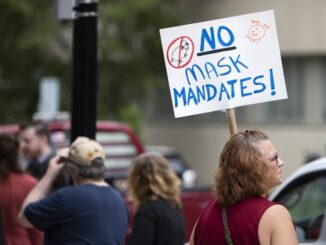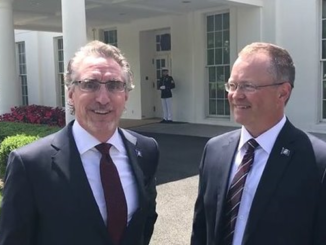
Two words are often found in debate regarding education, and we hear them most from Republicans— local control. It’s the argument — and the right one I might add — that so long as we’re going to have an education system it’s best to leave the decisions regarding it to locals. After all, who better to know the students and what their needs are? Well, those members of the 2019 Legislative Assembly who espouse such a position are about to get a gut check on just how serious they are about it.
The bill that is going to determine whether their words are rhetoric or reality is HB 1228. In a nutshell, this bill proposes allowing school districts to take “sole control over”:
“The supervision, development, and instruction of kindergarten through grade twelve students including course content standards, required instruction, instructional time, assessments, attendance, and graduation requirements for students residing in the district…
“The negotiating, employment, termination, licensing, and credentialing of teachers and ancillary staff…
“The establishment and adoption of student discipline and safety policies…”
How would this control be taken? It’s really quite simple, “By a majority vote of a quorum of the [school] board” or a “petition for local control is signed by at least thirty three percent of the qualified electors who reside in the district” and is then approved by a majority vote in a special election.
In short, this bill would give locals the option of opting out from the state having any control over the education of their children. It’s true local control— as it should be. After all, why should the state dictate to districts in Fargo or Williston how they educate their children? Or even small districts like those in St. Anthony and Marmarth?
What we’ve seen over the years is an increasing amount of centralization and top-down control over education. Can any thinking person honestly say that our local school boards have as much control over their districts as they once did? I’d suggest that they don’t. Between federal and state mandates, I sometimes wonder if school board members don’t feel more like figureheads or managers of finances and dictums than anything else.
During the 2015 and 2017 legislative sessions, we saw heated battles over the issue of eliminating the Common Core State Standards from the state. The teachers union (North Dakota United or NDU) and Department of Public Instruction (DPI) about lost their minds over the idea. On the one hand they fought to keep the standards, but on the other DPI Superintendent Kirsten Baesler assured the legislature — and anyone else in the state that would listen — that there would be new “North Dakota standards, written by North Dakota teachers”. Only they weren’t. Instead, Baesler and her team stripped out the Common Core labels and rebranded them as North Dakota standards. You can read the article that proved it here.
During the 2017 Legislative Session, both Superintendent Kirsten Baesler and Governor Doug Burgum celebrated passage of SB 2186, which was branded by some as the “Innovation in Education Bill”. This bill granted waiver powers to the Superintendent of Public Instruction in approving an “Innovative Education Plan”. In fact, this grant of power was so significant that long-time state legislator Rep. Kim Koppelman (R – District 13) told his colleagues on the House floor that he had never seen anything like it in all the years he had been in office. And this was after the House Education Committee stripped out verbiage that would have allowed the DPI Superintendent to waive any state statute or rule.
In the aftermath of its passage, I wrote this about SB 2186:
“As is typically the case with education bills, what does SB 2186 do? It leaves local school boards powerless. Or, [at best], they enjoy whatever power is permitted them by the state. They must go hat in hand to Bismarck (in particular the Superintendent of Public Instruction) for permission to implement plans of innovation. That’s a far different version of local control than the one I envision.”
HB 1228 would be historic. If desired, school districts could take control from the state over the education of their students. Things like Common Core could be eliminated at the district level. Innovative Education Programs would no longer need to be approved, because this bill literally strips the Superintendent of Public Instruction from having power over the districts— all with a vote of the school board or a majority of its residents.
Think about it. Control over…
- Standards
- Required Instruction
- Instructional Time
- Assessments
- Attendance
- Graduation Requirements
- The negotiating, employment, termination, licensing, and credentialing of teachers and ancillary staff.
- The establishment and adoption of student discipline and safety policies.
To say that the possibilities are significant would be an understatement.
The primary sponsor of HB 1228 is Rep. Jeff Hoverson (R – District 3). Hoverson is new to the North Dakota Legislature, but boy is he coming in with a bang. He’s already regarded as one of the most limited government-minded legislators in the entire 2019 Legislative Assembly. Only time — and his voting record — will prove that. But for now, Hoverson is off to a booming start. He even managed to get former Democratic gubernatorial candidate and State Representative Marvin Nelson (District 9) to sign onto the bill. Yet, Hoverson should expect major pushback.
Undoubtedly, the teacher’s union and DPI are going to have fits about this legislation. Though Hoverson sits on the House Education Committee, expect every scare tactic possible to be thrown at his colleagues in hopes of pressuring them into a Do Not Pass vote. Expect a push by some on the committee to propose butchering or neutering it through amendment. And if it makes it to the House floor intact, expect what might be the biggest push ever by NDU and DPI to kill a bill.
What we’re about to witness is a test for those who call themselves “Republicans” in the North Dakota Legislature. Will they stand for school boards and parents? Or North Dakota United and the Department of Public Instruction? What exactly do they mean when they claim to support “local control”? We’re about to find out.
Note: HB 1228 is currently scheduled for a committee hearing next Wednesday, January 16th, at 10:30am. We encourage you to call or e-mail members of the committee. Ask them to give this a Do Pass recommendation. And if you can attend Wednesday’s hearing and provide thoughtful testimony in support of the bill, we’d encourage that as well.
PLEASE LIKE & SHARE!
Sources:
- https://www.legis.nd.gov/assembly/66-2019/documents/19-0765-01000.pdf
- https://theminutemanblog.com/2017/09/12/north-dakotas-math-english-standards-are-the-result-of-plagiarism/
- https://www.legis.nd.gov/assembly/65-2017/bill-index/bi2186.html
- https://www.legis.nd.gov/assembly/66-2019/committees/house/education





